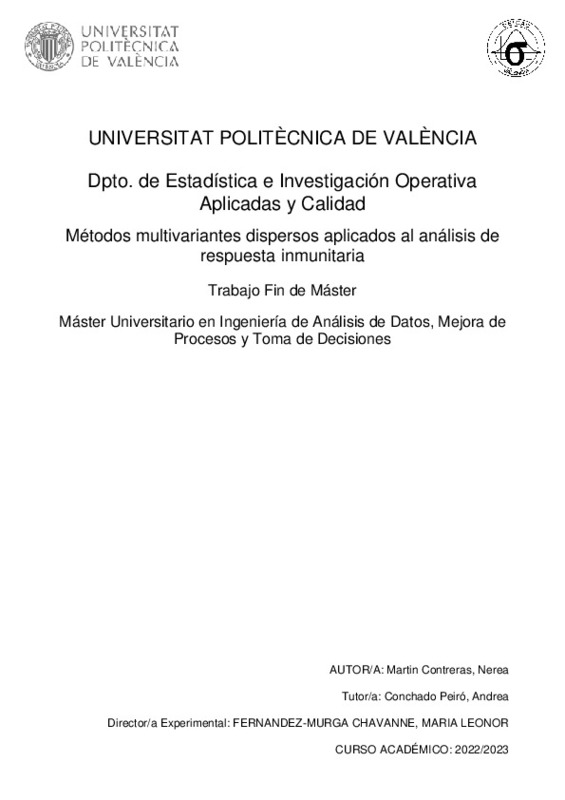|
Resumen:
|
[ES] La respuesta inmunitaria es un proceso complejo regulado en el organismo humano, mediante el cual el sistema inmunológico reconoce y combate patógenos. En el contexto de la pandemia de la COVID19, se ha llevado a cabo ...[+]
[ES] La respuesta inmunitaria es un proceso complejo regulado en el organismo humano, mediante el cual el sistema inmunológico reconoce y combate patógenos. En el contexto de la pandemia de la COVID19, se ha llevado a cabo una investigación intensiva para comprender y evaluar la respuesta inmunitaria generada por las vacunas contra el SARS-CoV-2.
A medida que se ha comprobado la eficacia de las vacunas tipo RNAm para prevenir y reducir los síntomas de la COVID19, surge la incertidumbre de cómo evaluar la respuesta inmune en grupos de pacientes oncológicos en tratamiento activo, quienes no participaron en los ensayos clínicos de desarrollo de las vacunas Además, se necesitan respuestas a preguntas relacionadas con la duración de la inmunidad, los efectos de diferentes tratamientos en la respuesta inmunitaria y el impacto del tipo de cáncer.
Explorar la relación entre células del sistema inmune y la producción de anticuerpos ayudará a comprender cómo se modula la respuesta inmunitaria inducida por la vacunación por RNAm contra laCOVID19 con cáncer. Se espera identificar posibles correlaciones entre los tipos celulares del sistema inmune y la magnitud de la respuesta inmunitaria humoral
generada por la vacuna en estos pacientes.
Estos estudios presentan desafíos metodológicos significativos, ya que involucran un número reducido de pacientes que contienen una gran cantidad de variables relacionadas con la respuesta inmunitaria. El objetivo de este trabajo es abordar estos desafíos y llevar a cabo un análisis exhaustivo de la respuesta inmunitaria y la producción de anticuerpos en pacientes con cáncer en tratamiento activo tras recibir la segunda dosis de la vacuna anti-COVID19.
Con el objetivo de lograr esto, se aplicarán diferentes métodos multivariantes, entre los que se incluyen enfoques dispersos, debido a la naturaleza de los datos. Estos métodos, mediante la implementación de técnicas de penalización o regularización, permitirán realizar una selección de variables, lo cual es especialmente relevante para el estudio. De esta manera, se busca demostrar la utilidad de los métodos multivariantes dispersos y evidenciar cómo estos ofrecen una solución efectiva al problema clínico planteado.
[-]
[EN] The immune response is a complex and regulated process in the human organism, whereby the immune system recognizes and fights pathogens. In the context of the COVID19 pandemic, intensive researches have been conducted ...[+]
[EN] The immune response is a complex and regulated process in the human organism, whereby the immune system recognizes and fights pathogens. In the context of the COVID19 pandemic, intensive researches have been conducted to understand and evaluate the immune response generated by SARS-CoV-2 vaccines.
While the effectiveness of RNAm vaccines in preventing and minimizing COVID19 symptoms has been proven, there is growing uncertainty about how to evaluate the immune response in actively treated oncology patient groups who did not participate in the vaccine development clinical trials. Additionally, there is a need for answer to questions regarding the duration of immunity, the effects of different treatments on the immune response, and the impact of cancer type.
Exploring the relationship between immune system cells and antibody production will help to understand how the immune response induced by mRNA vaccination against COVID19 is modulated. It is expected to identify possible correlations between the cell types of the immune system and the magnitude of the immune response generated by the vaccine in these patients.
These studies present significant methodological challenges, as they involve a small number of patients containing many variables related to the immune response. The aim of this work is to address these challenges and conduct a comprehensive analysis of the immune response and antibody production in cancer patients on active treatment after receiving the second dose of Anti-COVID19 vaccine.
In order to achieve this, different multivariate methods will be applied, including sparse approaches, due to the nature of the data. These methods, through the implementation of penalization or regularization techniques, will allow the selection of variables, which is particularly relevant to the study. In this way, the aim is to demonstrate the utility of sparse multivariate methods and to highlight how they provide an effective solution to the clinical problem at hand.
[-]
|







